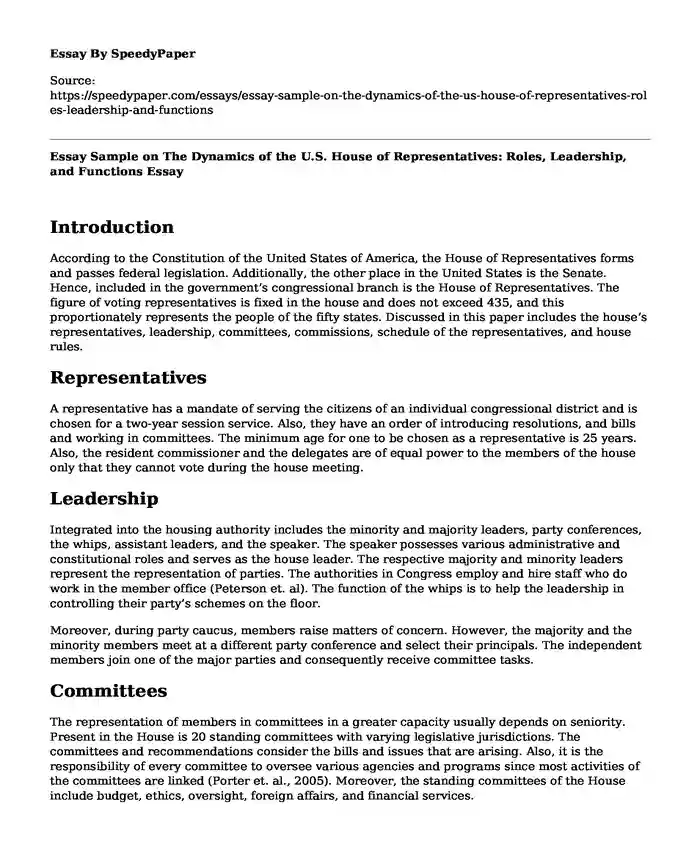
| Type of paper: | Essay |
| Categories: | Leadership analysis United States Government |
| Pages: | 3 |
| Wordcount: | 637 words |
Introduction
According to the Constitution of the United States of America, the House of Representatives forms and passes federal legislation. Additionally, the other place in the United States is the Senate. Hence, included in the government’s congressional branch is the House of Representatives. The figure of voting representatives is fixed in the house and does not exceed 435, and this proportionately represents the people of the fifty states. Discussed in this paper includes the house’s representatives, leadership, committees, commissions, schedule of the representatives, and house rules.
Representatives
A representative has a mandate of serving the citizens of an individual congressional district and is chosen for a two-year session service. Also, they have an order of introducing resolutions, and bills and working in committees. The minimum age for one to be chosen as a representative is 25 years. Also, the resident commissioner and the delegates are of equal power to the members of the house only that they cannot vote during the house meeting.
Leadership
Integrated into the housing authority includes the minority and majority leaders, party conferences, the whips, assistant leaders, and the speaker. The speaker possesses various administrative and constitutional roles and serves as the house leader. The respective majority and minority leaders represent the representation of parties. The authorities in Congress employ and hire staff who do work in the member office (Peterson et. al). The function of the whips is to help the leadership in controlling their party’s schemes on the floor.
Moreover, during party caucus, members raise matters of concern. However, the majority and the minority members meet at a different party conference and select their principals. The independent members join one of the major parties and consequently receive committee tasks.
Committees
The representation of members in committees in a greater capacity usually depends on seniority. Present in the House is 20 standing committees with varying legislative jurisdictions. The committees and recommendations consider the bills and issues that are arising. Also, it is the responsibility of every committee to oversee various agencies and programs since most activities of the committees are linked (Porter et. al., 2005). Moreover, the standing committees of the House include budget, ethics, oversight, foreign affairs, and financial services.
Additionally, the committee representing the whole house is the one in which every member serves. This committee meets in the House chamber to consider issues from the Union Calendar. The assignment of members to various committees is upon the agreement of the party leaders.
Commissions
Congress has formed a range of short and long-term permanent commissions serving as an advisory framework for policy development, research, and investigation matters. Besides that, the commissions can do administrative, parliamentary, and commemorative responsibilities. The composition of such commissions may involve citizens, members of the house, or both. Some of the commissions include the Financial Crisis Commission and the Security and Cooperation Commission.
Representatives' Schedule and House Rules
Centrally, the schedule of a representative is usually hectic, either working on Capitol Hill or congressional district. The topic briefing is done in the morning, beginning with a briefing of the topic. Briefings of issues are taken faster through the caucus, hearings of the committees, and meetings. Additionally, voting on bills is usually done together with speaking with constituents, mail constituent reviewing, and press clips. Likewise, the Ethics Committee has the power to enforce rules and conduct of members and employees in line with performing other responsibilities.
Works Cited
Pearson, K. and Dancey, L. “Elevating Women’s Voices in Congress: Speech Participation in the House of Representatives.” Political Research Quarterly. 2010. https://journals.sagepub.com/doi/abs/10.1177/1065912910388190
Peterson et. al., “House of Representatives and Senate Staff Levels in Member, Committee, Leadership, and Other Offices.”2010. https://www.everycrsreport.com/files/20100810_R41366_6692732869e63445e02690dc162dcfbfc0bbd8ba.pdf
Porter, M. et. al. “A network of Analysis in the U.S House of representatives.” Proceeding of the National Academy of Sciences of the United States of America. 2005. https://www.pnas.org/content/102/20/7057.
Cite this page
Essay Sample on The Dynamics of the U.S. House of Representatives: Roles, Leadership, and Functions. (2023, Dec 10). Retrieved from https://speedypaper.net/essays/essay-sample-on-the-dynamics-of-the-us-house-of-representatives-roles-leadership-and-functions
Request Removal
If you are the original author of this essay and no longer wish to have it published on the SpeedyPaper website, please click below to request its removal:
- Free Essay Sample on The Licensing Act of 1662
- Free Essay Example about Veterans Support
- Free Essay on Leadership Program Participation among International Students
- Essay Sample on Analysis of Jonathan Edwards' Sermon
- Reconstruction Challenges and Progress: A Glimpse into Post-Civil War America - Essay Example
- Critical Issues Facing the U.S and their Solutions - Paper Sample
- Free Essay Example - About Steven Orfali
Popular categories




